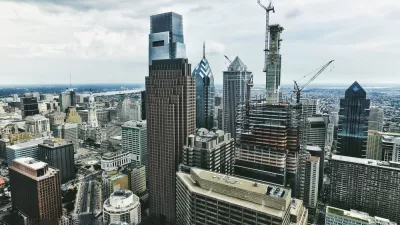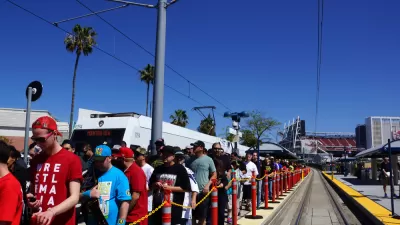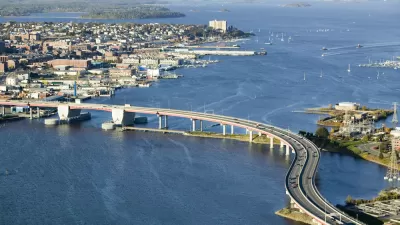Following on the recent, promising news of increased transit ridership around the country, one writer calls for an end to the institutional bias toward cars. The key point of the appeal: public transit infrastructure benefits the middle class.
Following on the recent statistics that show transit ridership approaching record levels not seen since the 1950s, Jon Terbush follows up with an article detailing the positive benefits of investments in public transit—as compared to the status quo of political dominance by investments favoring the automobile and reductions in transit service.
“And just as improvements to public transit mostly impact the middle class, so, too, do negative service changes. Indeed, the erosion in the middle class' share of overall income correlates neatly with a reduction in federal infrastructure spending.”
“Moreover, the lion's share of economic activity created by pouring money into mass transit would go to the middle class. A 2012 Treasury report concluded that 80 percent of the jobs created by infrastructure investments — not only in public transit, though that would make up a great deal of the investment spending — would go to three sectors: construction, manufacturing, and retail trade. Of those jobs, 90 percent would be expected to offer middle-class wages.”
FULL STORY: How the U.S.'s obsession with cars is hurting the middle class

Trump Administration Could Effectively End Housing Voucher Program
Federal officials are eyeing major cuts to the Section 8 program that helps millions of low-income households pay rent.

Planetizen Federal Action Tracker
A weekly monitor of how Trump’s orders and actions are impacting planners and planning in America.

Ken Jennings Launches Transit Web Series
The Jeopardy champ wants you to ride public transit.

Rebuilding Smarter: How LA County Is Guiding Fire-Ravaged Communities Toward Resilience
Los Angeles County is leading a coordinated effort to help fire-impacted communities rebuild with resilience by providing recovery resources, promoting fire-wise design, and aligning reconstruction with broader sustainability and climate goals.

When Borders Blur: Regional Collaboration in Action
As regional challenges outgrow city boundaries, “When Borders Blur” explores how cross-jurisdictional collaboration can drive smarter, more resilient urban planning, sharing real-world lessons from thriving partnerships across North America.

Philadelphia Is Expanding its Network of Roundabouts
Roundabouts are widely shown to decrease traffic speed, reduce congestion, and improve efficiency.
Urban Design for Planners 1: Software Tools
This six-course series explores essential urban design concepts using open source software and equips planners with the tools they need to participate fully in the urban design process.
Planning for Universal Design
Learn the tools for implementing Universal Design in planning regulations.
Ada County Highway District
Clanton & Associates, Inc.
Jessamine County Fiscal Court
Institute for Housing and Urban Development Studies (IHS)
City of Grandview
Harvard GSD Executive Education
Toledo-Lucas County Plan Commissions
Salt Lake City
NYU Wagner Graduate School of Public Service





























